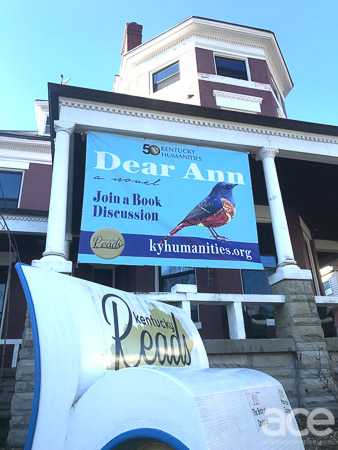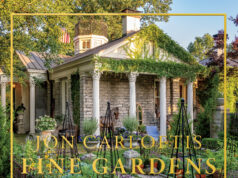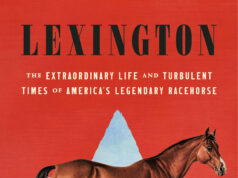Kentucky Humanities has selected Bobbie Ann Mason’s Dear Ann for its 2022 Kentucky Reads. The novel will be at the center of statewide conversations on nostalgia, the choices we make and how they affect our lives, and thinking back on the road not taken.
Kentucky Reads will offer 50 scholar-led discussions of Dear Ann to community organizations throughout the Commonwealth. Kentucky Humanities has accumulated a group of scholars who will lead discussion about the themes of the book.
Any non-profit organization in Kentucky can host a discussion of Dear Ann for a booking fee of $50 and each host organization will be provided with 15 copies of the novel to share among participating members. Publicity materials to promote the discussion will also be provided. Host organizations will determine if their scheduled discussion will be held in-person or virtually. Bookings will begin on January 1, 2022.
Bobbie Ann Mason’s work has riveted audiences for decades and Dear Ann is no exception.
— Bill Goodman, Kentucky Humanities Executive Director.
“Bobbie Ann Mason’s work has riveted audiences for decades and Dear Ann is no exception,” said Bill Goodman, Kentucky Humanities Executive Director. “We are thrilled to announce Bobbie Ann’s latest book as our 2022 Kentucky Reads selection and look forward to the conversations Dear Ann will bring about throughout the state.”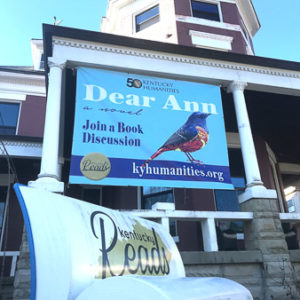

The Vietnam War serves as the background of a love story in the turbulent ’60s in Bobbie Ann Mason’s newest book, Dear Ann. Ann Workman, a smart yet naïve misfit, travels from rural Kentucky to attend graduate school in search of education and to fall in love. Many years later, Ann recalls this time of innocence as she faces another life crisis. Seeking escape from her problems, she tries to imagine where she might be if she had chosen differently all those years ago.
Bobbie Ann Mason was raised on her family’s dairy farm in western Kentucky. She earned a B.A. in English at the University of Kentucky, an M.A. at the State University of New York at Binghamton, and a Ph.D. at the University of Connecticut. Her groundbreaking Shiloh and Other Stories won the PEN/Hemingway Award and was short-listed for the National Book Critics Circle Award, the National Book Award, and the PEN/Faulkner Award. She has won two Southern Book awards and numerous other prizes, including the O. Henry and the Pushcart. She is former writer-in-residence at the University of Kentucky and lives in Kentucky.
Kentucky Humanities’ first edition of Kentucky Reads, in 2018, featured Kentucky native Robert Penn Warren’s Pulitzer Prize-winning novel: All the King’s Men to guide statewide conversations on contemporary populism, political discourse, and their relationship to journalism. In 2020, Wendell Berry’s Hannah Coulter was chosen, and in 2021 Crystal Wilkinson’s The Birds of Opulence was featured.
Ten Years Ago in Ace
From the Ace Archives: 2012
Road Report, by Bobbie Ann Mason
A few years ago, I gave a reading at a library in Kentucky, and in the book-signing line I met a nine-year-old girl with her mother, who told me that the child, Samantha or perhaps Emily, had done a special school project on me. The students each chose a Kentucky author and played the role of that author for a day. Samantha dressed up as me in some kind of frontier shirt and a long skirt (that’s me?), and gave a presentation.
The mother handed me a sheet of paper Samantha had written in her role as me. It read, “Hello. My name is Bobbie Ann Mason. I am a Kentucky author. I was born in 1940. AND YET I am still alive….”
Thirty-three kind people had waited for me, and they had bought thirty-five books, brought in from a Barnes and Noble thirty-five miles away.
—Bobbie Ann Mason
Good news, readers! I am still alive to this day. Also, I can drive yet. The days of the book tour are over, but the self-catered tour thrives, and there is no shortage of public libraries eager to entertain a visiting writer and even sell their books. Often this is where you find the most dedicated readers.
Recently I was invited to the public library in the small town of Greensburg, in south-central Kentucky, about eighty-five miles south of Louisville. I had marked two p.m. on my calendar, on a Saturday afternoon. Before I left, I had a notion to double-check what time zone Greensburg occupied. I lived by Eastern time, but Greensburg, as I had suspected, is just across the boundary into Central time. Therefore, two meant three o’clock. I set off at 12:30 for a leisurely drive, allowing myself extra time for the seventy miles or so, because the route was on state highways, not four-lanes.



I had brought some food with me, since I don’t like to stop at fast-food joints. I didn’t expect to find a roadside picnic table, so half-way there I pulled into a vast Wal-Mart parking lot and ate my meager snacks while checking my e-mail. Alas, I forgot the chocolate! I set off again, admiring the hyper-green countryside. There had been some recent rain after the punishing drought, and the fields were lush. In the distance I could see hills, and the land started a rolling and dipping effect, but the road was good. When I stopped at a McDonald’s in Campbellsville to indulge in their restroom, I found some urgent messages on my phone, “Ms. Mason, are you lost? We were expecting you at one o’clock! Several people are waiting for you!” Heaven and earth! I was a victim of the time-zone border wars! I had thought the two on my calendar meant two their time, not my time.
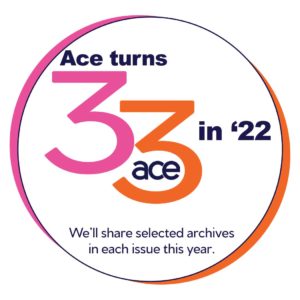

They were waiting for me! The spacious open center of the library had been set up with chairs. It was a comfortable, pleasant place to read a chapter from my novel, and I launched right in. The beaming faces made me feel welcome. While they were waiting, the library had served everyone lunch, a substantial spread of fancy finger foods that I could have enjoyed too if I had not loitered with my repast in the Wal-Mart parking lot.
The friendly audience had plenty of questions for me, and a few shared their own stories of World War II, the subject of my novel. I had brought my props–a B-17 model, some photographs. It was a war I had tried to imagine, but some of the older patrons there had clear memories of that awful time. Inside the library was a large display of photographs of local veterans, a project done for Veterans Day last year.
Afterwards, I signed books and chatted. I signed a book for a woman named Maxideen, who had lived in France, where my novel takes place. Then a man named Larry Coomer showed me a folder of photos. He said he had driven the sound and cinematography truck for the filming of my novel about the Vietnam war, “In Country,” in the summer of 1988. He was very proud of doing that job. He showed me a glossy photo of the crew, about fifty people with director Norman Jewison in the center and young actress Emily Lloyd, a teenager then, smiling radiantly. Everyone had loved Emily. I recognized a few faces. I didn’t see Bruce Willis, but then he had avoided everyone and hid in his trailer. Mr. Coomer asked me to sign the picture. I had had little to do with the movie, but the photo made me nostalgic, especially about Emily. Emily, the funny, lovable lead in the movie —my Sam—is now 42. Where is she now?
Then Mr. Coomer asked me to sign the script. It was written by Frank Pierson, the renowned screenwriter who had died just the week before at age 87. He was a trim, elegant 63 back in 1988.
And yet I am still alive.
I hated to leave Greensburg, a very pretty little town all spiffed up with tourism grant money, and I vowed to return with a more careful knowledge of time zones. Greensburg is a fairly remote small town, yet enthusiastic in its love of books. Thirty-three kind people had waited for me, and they had bought thirty-five books, brought in from a Barnes and Noble thirty-five miles away.
And I am not at all surprised. The annual Kentucky Book Fair, a huge event in the state capital attended by thousands, has been raising money for the state’s libraries for thirty years. Besides, Kentucky boasts an enormous population of homegrown writers–who grew up nourished by libraries. Libraries hold our histories, our memories, our stories. Now and then a writer who is still alive may show up as proof of something still going on in the realm of books.
This article also appears on pages 8 & 9 of the January 2022 print edition of Ace.
Subscribe to the Ace e-dition for Lexington news, arts, culture, food, and entertainment news delivered to your inbox.
Call today to advertise in Ace, 859.225.4889


